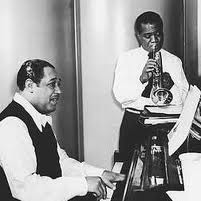Archives for 2010
BOOK
Norman Lebrecht, Mahler Remembered. Snippets and excerpts from contemporary memoirs, interviews, and newspaper and magazine stories, deftly arranged into a mosaic-like portrait of Gustav Mahler that is more readable than any existing biography of the composer. The place to start if you’ve just discovered Mahler’s music and want to know what the man was like (TT).
CD
Willem Mengelberg and the Concertgebouw Orchestra, Mahler Symphony No. 4 in G Major. A 1939 radio broadcast by a conductor who knew Mahler well, took detailed notes on the composer-conductor’s interpretation of the Fourth Symphony, and wrote them into his own score of the work. The result is a performance full of extravagantly romantic gestures whose authenticity, if problematic, is almost always convincing to the ear. Not that it matters, but the sound is quite tolerable (TT).
GALLERY
Helen Frankenthaler, Frankenthaler: East and Beyond (Knoedler & Company, 19 E. 70, January 8-March 11). Twelve paintings and twenty woodcuts reflecting Frankenthaler’s longstanding interest in Asian art. If you’re into color-field abstraction, be there (TT).
CD
The Complete 1932-1940 Brunswick, Columbia and Master Recordings of Duke Ellington and His Famous Orchestra (Mosaic, eleven CDs). A boxful of prime stuff from the master, remastered with unprecedented sharpness and clarity and accompanied by Grammy-worthy liner notes by Ellington authority Steven Lasker. All surviving alternate takes are included, but they’re bunched at the end of each disc, thus making for infinitely more pleasurable listening. No, it’s not cheap, but you’ve still got to have it, and the edition is strictly limited to 5,000 copies. Don’t dally–they’re not kidding (TT).
BOOK
David R. Dow, The Autobiography of an Execution (Twelve, $24.99). An astonishingly well-written memoir by Texas’ best-known death-row lawyer in which he describes the nuts and bolts of how his clients make their (usually inevitable) way to the grave. No matter how you feel about capital punishment–and especially if you support it, whether staunchly or uneasily–this book will bring you face to face with the arbitrary, often capricious way in which the death penalty really works. It’s the most sobering book that I read in 2010 (TT).
PLAY
Who’s Afraid of Virginia Woolf? (Steppenwolf Theatre Company, Chicago, closes Feb. 13 and reopens in Washington, D.C. Feb. 25). Tracy Letts, the author of August: Osage County, stars in a stunningly direct and unadorned production of Edward Albee’s best play, backed up by a perfect ensemble cast and directed with precision and simplicity by Pam MacKinnon. I saw it a week too late to cram it into my best-of-the-year list, but you can be it’ll be there come 2011 (TT).
TT: The old year passeth
This has been quite a year for Mrs. T and me, in some ways difficult, in others gratifying. We’ve seen a hundred shows, moved to a new neighborhood in Manhattan, taken a full-fledged vacation, driven up Highway 1 from San Diego to San Francisco, spent two wonderful months in residence at Rollins College in Winter Park, Florida, and generally kept moving–far too much for our mutual good, I fear, but we did what we had to do and it didn’t kill us, so that’s that.
 I doubt that the year to come will be much less busy, but I hope and expect that it will be even more satisfyingly eventful. Next week we start making our circuitous way to Winter Park for a second residency, in the course of which, among other exciting things, I’ll be directing excerpts from my first play, a one-man show about Louis Armstrong called Satchmo at the Waldorf, about which much more in due course. I’ll also be buckling down to write a sizable chunk of my next book, Black Beauty: A Life of Duke Ellington, and zooming all around the country in search of memorable theater. Sooner or later we’ll unpack the rest of the boxes in our new apartment and start rehanging the Teachout Museum in earnest.
I doubt that the year to come will be much less busy, but I hope and expect that it will be even more satisfyingly eventful. Next week we start making our circuitous way to Winter Park for a second residency, in the course of which, among other exciting things, I’ll be directing excerpts from my first play, a one-man show about Louis Armstrong called Satchmo at the Waldorf, about which much more in due course. I’ll also be buckling down to write a sizable chunk of my next book, Black Beauty: A Life of Duke Ellington, and zooming all around the country in search of memorable theater. Sooner or later we’ll unpack the rest of the boxes in our new apartment and start rehanging the Teachout Museum in earnest.
What Mrs. T and I won’t do is take our good fortune for granted, starting with the astonishing fact of our being together. It is, I suspect, exceedingly rare for two people in the middle of life to make a marriage as close as this one has become. When you marry late, every day is a surprise and a blessing. I nearly died five years ago this month, at exactly the same moment that I met and fell in love with Hilary, which makes what has happened to us (and what didn’t happen to me) all the more poignant.
I take a dark view of many, perhaps most things, but I try very hard to live life with a smile. Somewhere or other Joseph Epstein wrote that H.L. Mencken’s lifelong pessimism never stopped him from getting a good dinner, which seems to me exactly the right attitude toward the world and its myriad woes. I know that they exist, but I also know that I am a lucky man, and so long as my luck holds, I hope never to do it the injustice of ingratitude.
On that note, I wish for all of you the happiest and most hopeful of new years. May you laugh often, cry only when you want to, and never be bored!
